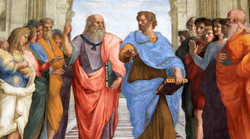16th-century philosophy
Topic: Philosophy
 From HandWiki - Reading time: 3 min
From HandWiki - Reading time: 3 min
| History of Western philosophy |
|---|
 |
| The School of Athens fresco by Raphael |
| Western philosophy |
|
|
| See also |
16th-century philosophy is generally regarded as the later part of Renaissance philosophy.
Early 16th-century philosophy is often called the High Renaissance and is considered to succeed the Renaissance philosophy era and precede the Age of Rationalism. Notable philosophers from the time period include Desiderius Erasmus, Thomas More, Niccolò Machiavelli, Samuel von Pufendorf, Nicolaus Copernicus, and Michel de Montaigne and Joest Lipps.[1]
The 16th century is characterized by a mixture of humanist and scholastic traditions. Notable developments in vocabulary occurred, with the introduction of the words ‘psychology’ (coined by Marko Marulic) and ‘anthropology’ (first used by Magnus Helt). ‘Psychology’ in the 16th century context referred to discussions of the origin of the human soul. ‘Anthropology’ was used in a narrower context than we are used to today, in strict reference to the relationship between both the human soul and human anatomy as they both comprise human nature.[2]
Logic (as represented by the likes of John Mair) began to fall out of favor among most European countries around the early to mid 16th century, and a directional shift occurred towards Aristotelian interpretations. Erasmus' work Antibarbarians was published in 1520, thirty years after he wrote it, defending the study of ancient philosophers and scholars, broadly referred to as 'classical education,' while conveying the belief that the study of philosophy is crucial in order to preserve the Christian faith.[2]
Academic skepticism had a growing influence, represented by people like Omar Talon and Cornelius Agribba von Nettesheim, who wrote On the Vanity and Uncertainty of the Arts and Sciences and the Excellence of God’s Word.[2]
Overall, the writings of Aristotle were one of the most commonly used subjects of great philosophical commentary. One of the most influential aspects of Aristotle informing 16th century thought was that the soul could be viewed as belonging on two axes of sensitive-intellective (emotions and desires) and cognitive-appetitive (the will). Juan Luis Vives, a humanist considered to be ‘the father of modern psychology,’[2] was one of a few to attempt to explore an alternative to the Aristotelian psychological model, rejecting metaphysical approaches to understanding the soul and instead placing priority on understanding it through describing its functionality (although fails to successfully arrive at a fully formed alternative). His arguments centered around humanity's intellectual inability to completely understand what a soul is.[2]
The individual, in the 16th century, was understood only (again through an Aristotelian lens) through their political community or homeland, with the task of pursuing moral virtue. Humanity's tendency towards fostering political communities was seen as both a natural and entirely unique characteristic belonging to man. [2]
References
- ↑ Early Modern Philosophy: Essential Readings with Commentary, edited by A. P. Martinich, Fritz Allhoff, Anand Jayprakash Vaidya, Wiley-Blackwell, 2007, "General Introduction."
- ↑ 2.0 2.1 2.2 2.3 2.4 2.5 Lagerlund, Henrik. Routledge Companion to Sixteenth Century Philosophy. 1st ed. Routledge, 2017. https://doi.org/10.4324/9781315770512.
 KSF
KSF